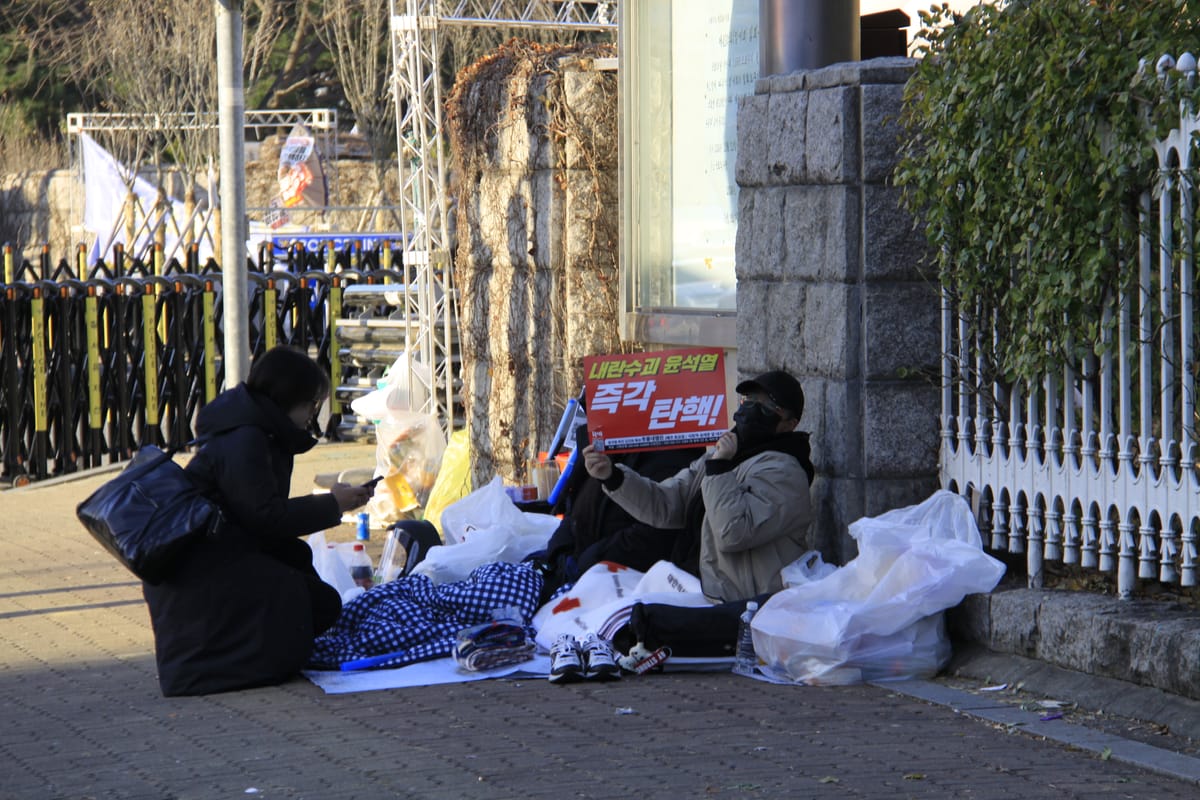Special Edition on South Korea

Hello and Happy New Year to all of us!
In Korea, we greet each other for the New Year – '새해 복 많이 받으세요 (Sae-Hae, Bok Mani Bat-U-Se-Yo),' which literally means 'Much good fortune for your New Year.' You can use this phrase in Korea or to Korean-speaking people throughout the new year season from January 1 until mid-February Lunar New Year.
As noticed in an earlier newsletter, I have prepared a special first edition on South Korea, my home country, about the recent political turmoil and its meaning in the Asian context.
(Those who want to digest the news of martial law declaration on December 3, 2024, please scroll down to check the box at the bottom.)
It all started out on the Tuesday night of December 3, 2024 at 2200 when the President Yoon Seok-yeol appeared in live television streaming to declare emergency martial law, which means fully suspending civilian legal process.
Although it was quickly lifted by the parliament, the event has become a landmark in Korean and Asian history textbooks, as it turned out to be a rebellion orchestrated by the country's president. The president’s purpose was to dissolve the National Assembly and the National Election Commission by sending troops to these constitutional institutions. As a result, the event has been dubbed ‘Yoon Seok-Yeol’s Dec. 3 Rebellion’ by 'Newstapa,' also known as the Korea Center for Investigative Journalism, where I currently work.
In a televised address, Yoon accused opposition parties of "anti-state activities" and alleged ties to "North Korean communists.” Evidence shows that the real motive behind Yoon’s Dec. 3 rebellion was to establish an autocracy by red-tagging opposition lawmakers and incapacitating constitutional institutions.
It might be unprecedented to some western observers to see an acting president’s coup attempt or rebellion to destroy democratic system for a longer term seizure of power, but it is precedent in many Asian countries.
Long list will follow to demonstrate such examples in Asia. Almost all countries of South and Southeast Asia after 1945 independence experienced martial law. As in South Korea, many of these instances of martial law enabled ruling powers to seize ultimate control over existing democratic civilian orders.

Why did it happen in South Korea, now?
Allegedly, there are two direct triggers to Yoon’s Dec.3 rebellion: unsubstantiated election fraud conspiracy theory of far-right YouTubers and the ‘Myung Tae-gyun scandal’ that exposed illegal political funding connected to President Yoon and First Lady Kim Keon-hee. While the conspiracy theory of rigged parliamentary elections gave Yoon a rationale and confidence to dissolve the National Assembly, Myung Tae-gyun scandal deeply disconcerted Yoon and made Yoon take immediate action to stop the unfolding scandal.
Above all, Yoon did not believe in civilian democracy.
According to South Korean lawmaker Park Sun-won, Yoon’s Dec.3 martial law rebellion has been played out as far back as March 2024 led by Counterintelligence Command. Rep. Park was one of the first to detect the signal and raised alarms of the martial law declaration plan of the President and Defense Minister – both are Chungam High School alumni.
Rep. Park stated, "During the joint South Korea-U.S. military exercises in March 2024, the Counterintelligence Command reportedly devised plans involving which units to deploy and how to mobilize them, effectively conducting preliminary martial law training."
He added, "I have heard that the Counterintelligence Command, during the joint military exercises in March, conducted drills on how to relocate units during martial law and manage the situation as part of a Joint Investigation Headquarters."
It has been claimed that a martial law scenario was prepared and rehearsed at least nine months ago, led by the so-called 'Chungam High School Line.' Rep. Park further noted, "In March, the Interior Minister Lee Sang-min and National Investigation Headquarters Chief Woo Jong-soo visited the Counterintelligence Command to agree on cooperation, and it was around that time that they had a meal with certain mid-ranking officers from Chungam High School."

This is part of the legacy of Korea’s contemporary political history marred by military dictatorship. The 1979 military coup, led by a faction from the Military Academy, was echoed in 2024 when another faction, this time bound by high school ties, tried rebellion for dictatorship.
Witnessing the repetition of corrupt military ambitions undermining democratic civilian systems in Asia is both tragic and traumatizing.
To many of us in Asia, whether some of us have forgotten or not, military dictatorship against communist threats or a president wielding military power to rule the country means mass killing or forced disappearances. It also means a generations old social and physical trauma to heal. That is the history of Indonesia, Philippines, India, Thailand, Malaysia, Singapore, and more.
What president Yoon has done throughout 2024 in preparing for and declaring martial law with his military commanders is an insult to seven decades of Asian people’s struggle for healing and building a civilian order.
Unless Yoon Seok-yeol is tried in criminal court for rebellion, haunting political history will repeat. But first to first, let the Constitutional Court remove Yoon from office soonest.
I haven’t activated a link to the paid subscription button to this newsletter, but when I have from next time, please be kind enough to buy me a cup of black coffee or tea, usually around 4,000 Korean won or 3 US dollar, for me to write this letter to you twice a month on every other Wednesday.
Best wishes,
Seulki

